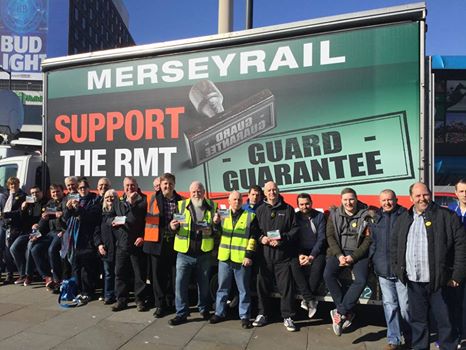RMT Socialist Party members
Delegates to the RMT transport union’s special general meeting (SGM) have voted to maintain the union’s current political strategy and not to affiliate to the Labour Party.
The union will develop its existing strategy of supporting Jeremy Corbyn’s leadership but the right-wing grip on the parliamentary Labour Party (PLP) and local councils, together with the absence of real influence for affiliated unions, prevented affiliation at this time.
The different political situation in Scotland also made a proposal for affiliation extremely difficult.
The SGM debate reflected the understanding, on all sides, that Jeremy Corbyn’s election as leader opens up the possibility of Labour becoming a genuine mass workers’ party.
The issue of contention was how best to respond to this. The discussion at the SGM was framed by the 2017 annual general meeting where delegates had raised specific concerns.
Not least of these was the question of Scotland. The RMT had been the only union to ballot its members in Scotland before the 2014 independence referendum, coming out for a Yes vote while Labour campaigned for No.
Yet affiliation would mean that the union could only support Labour candidates in Scotland. The majority of Scottish branches and the Scottish RMT opposed affiliation and Scottish delegates explained that, with Labour-led councils carrying out cuts, it is generally still seen to be pushing the same austerity politics as the Tories.
The role of the new ‘Corbynista’ Scottish Labour leader, Richard Leonard, was also highlighted. He has spoken against austerity but he recently voted with the right in Labour’s national executive committee (NEC) vice chair election, denying Corbyn an important ally in the post. He also currently opposes even the right for Scotland to have a second independence referendum.
Other issues outstanding from the 2017 AGM included Labour’s attitude to driver-only operation (DOO) of trains and cuts on London Underground and Transport for London (TfL).
Labour councillors have a majority on the authorities that oversee Merseyrail and Northern Rail, who are implementing DOO. Corbyn and the shadow chancellor, John McDonnell, have supported the union’s fight against DOO but many SGM delegates wanted them to go further and pull the councillors and Mersey Mayor into line.
London SGM delegates raised similar points about Labour Mayor Sadiq Khan’s cuts on TfL. Instead of publicly opposing cuts and demanding funding from the government, Khan is enthusiastically implementing them. Yet there are no calls from the leadership or Labour left for him to shift his stance.
Can RMT members on the tube really be asked to support, let alone contribute towards, Khan’s next election campaign?
The SGM heard from delegates who supported affiliation and, without question, there would be some advantages to be had such as the right of affiliated union branches to vote on whether to run a ‘trigger ballot’ selection process in local parties (though only after the NEC agrees a timetable for this).
Overblown claims
But most delegates felt the claims of the pro-affiliation campaign were overblown. A seat on the NEC is not guaranteed and the RMT could only expect 16 delegates at Labour Party conference (less if we didn’t affiliate our full membership) out of 2,700 or so.
On balance, delegates voted to spend RMT’s political fund on candidates who support RMT policy and not dilute that across the PLP and right-wing Labour councillors.
RMT must now unite around the agreed SGM outcome. A serious campaign with other left unions could transform the Labour Party root and branch and open the way for possible affiliation.
But there are also concerns that proponents of affiliation may seek to bring RMT closer to the position of the majority of Labour councillors and MPs rather than seeking to transform the party.
It is noticeable that the union’s public pronouncements on Welsh Labour privatising border railways have shifted alarmingly in recent weeks.
In August 2017 the RMT general secretary wrote to the Welsh First Minister and said: “I am staggered to find that it is a Welsh Labour government that is privatising Network Rail’s infrastructure and is acquiescing with a Westminster Tory government in the piecemeal privatisation and break up of Network Rail.”
But by May 2018 the tone had changed markedly: “RMT policy is for a national integrated railway under public ownership and the Welsh government has made it clear that this is their aspiration as well if they did not have to work under the pro-privatisation legislative straight jacket imposed by the UK government.”
Any attempt to soften RMT’s own political position to allow for affiliation would be disastrous. This is also true of RMT’s industrial position.
A political strategy to deliver a Corbyn-led government must never become a substitute for militant industrial action on DOO, tube cuts, seafarers’ rights or any other fight we become involved in.









